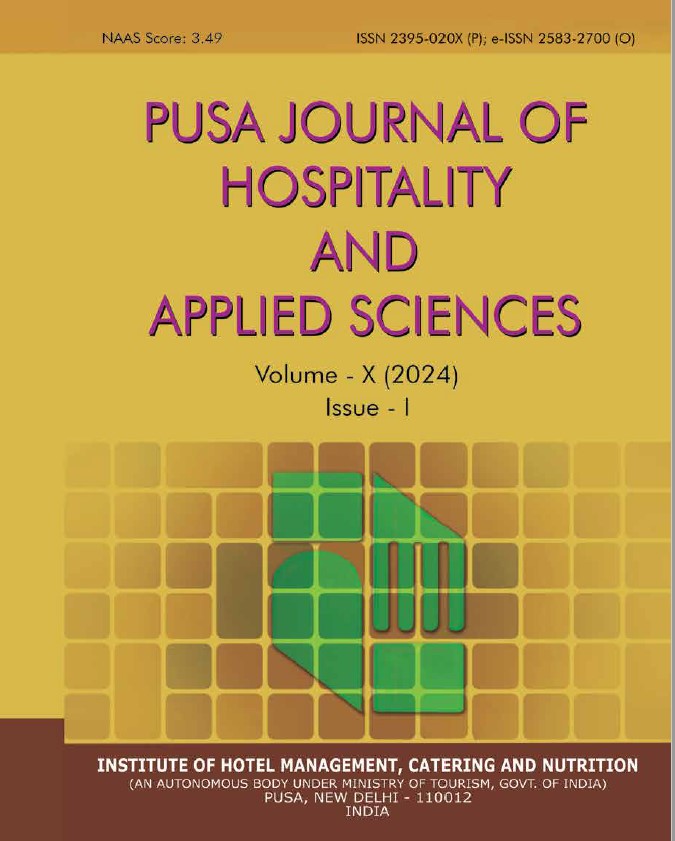ANALYSING DEMOGRAPHIC TRENDS AND VISITORS SATISFACTION AT THE NATIONAL MUSEUM, DELHI
DOI:
https://doi.org/10.48165/pjhas.2024.10.1.2Keywords:
Visitor expectations, Visitor Satisfaction, Visitor Experience, Personalization, National MuseumAbstract
Background: As demographics shifts continue, the National Museum in Delhi consistently adapts to ensure visitor satisfaction through diverse and enriching experiences. The study at the National Museum in Delhi delves into visitor demographics, preferences, and satisfaction, aiming to answer three primary research questions regarding visitor expectation, personalization, and satisfaction while pursuing three key objectives through exp loring the interplay among these factors. Objectives: To assess the alignment between visitor expectations and experiences, identifying contributing factors, to evaluate the extent of personalization at the museum and propose enhancement strategies, to investigate the impact of improved personalization on visitor satisfaction, aiming to achieve key study objectives. Methodology: A quantitative approach was employed, utilizing surveys to gather data from a sample of 100 museum visitors in Delhi. Structured questionnaire focused on visitor demographics, motivations, satisfaction level, and feedback. Canonical Correlation Analysis (CCA) and regression analysis were used for data analysis. Results: Visitors’ profile, indicating a predominant age group of 35-44 years comprising 28%, while most visitors hold Bachelor degree at 37%. Additionally, the survey reveals that 40% of respondents visit National Museum occasionally, followed by 30 % who visit rarely. No statistically significant influence of visitor characteristics or behaviours on the museum’s ability to cater to a diverse audience is found. Conclusion: The research provides valuable insights into visitor experiences and behaviours at the National Museum in Delhi. Despite limitations such as a small sample size and cross-sectional nature, the findings lay a foundation for understanding factors shaping visitor experiences. Practical implications are discussed for enhancing satisfaction and personalization efforts, with a call for further research to consider larger and more diverse samples and different variables.
References
Bose, S., & Choudhury, R. (2017). Data collection challenges in museum visitor studies: A case study of the national museum, Delhi. Museum Management and Curatorship, 35(2), 172-189.
Dutta, M. (2016). Age and education-related visitor preferences at the national museum, Delhi. International Journal of Museum Management and Curatorship, 30(3), 293-308.
Jeong, J. H., & Lee, K.H. (2006). The physical environment in museums and its effects on visitors’ satisfaction. Building and Environment, 41(7), 963–969. https://doi. org/10.1016/j.buildenv.2005.04.004
Kompatsiaris, P. (2020). Curators, words, and values: The branding economies of curatorial statements in art biennials. Journal of Cultural Economy, 13(6), 758-771. Doi:10.1080/17530350.2020.1716825
Malhotra, V. (2019). Exhibition design and interpretation: enhancing visitor satisfaction at the national museum, Delhi. Museum and Heritage Studies, 5(1), 54-68.
Mukherjee, S. (2020). Cultural sensitivity and inclusivity in museum exhibits: a study of the national museum, Delhi. International Journal of Cultural Diversity and Inclusivity, 6(2), 95-112.
Pradhan, B., Roy, M., & Bhatia, S. (2023). Enhancing tourists’ satisfaction through blockchain technology. PUSA Journal of Hospitality and Applied Sciences, 9, 37–47. https://doi.org/10.48165/pjhas.2023.9.2.5
Sengupta, R., & Dey, S. (2017). Tourism and international visitors at the national museum, Delhi: A demographic study. Journal of Museum Studies, 15(2), 123-138
Verma, A., & Aggarwal, P. (2018). Technology and visitor engagement at the national museum, Delhi: A comparative study of mobile apps and virtual tours. Journal of Museum Technology, 42(3), 214-230




